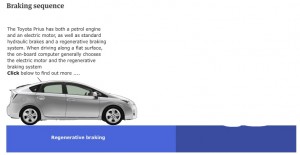This morning’s Observer column.
IF, LIKE MILLIONS of others, you use Gmail, Google’s webmail service, you will have been startled last week by the sudden appearance of a cuckoo in your email nest. When you log in to collect your mail, an invitation to “try Buzz in Gmail?” – “no setup needed” – pops up. There’s no indication of what this “Buzz” is, but if you click “try” a window opens saying you’re now “following” a number of people and that a number of people are “following” you. Below this comes a stream of Twitter-like postings from your followees.
This will come as a surprise, because you have no recollection of making any decision to follow anyone, or of soliciting followers yourself. And this is in fact the case: Google has simply gone through your email inbox and designated some of those with whom you correspond frequently as followees. And you were at no stage consulted about any of this…
The more I think about Buzz the more it reminds me of Gilbert Ryle’s concept of a ‘category mistake’, i.e. a situation where we think of something in terms appropriate only to something of a radically different kind. For me, email is an entirely private tool — for confidential communications with carefully selected individuals. The designers of Buzz, however, seem to have assumed that email is inherently social — i.e. involving communication in public. For me — and I suspect for millions of others — this is emphatically not the case. I’m happy to use social networking tools like this blog and Twitter for public stuff. But email is for private stuff — even when I’m sending a message to multiple recipients.
Another thought: this time about the abrupt way in which Buzz was introduced. As I said in the column, it smacks of Microsoft-type arrogance. I don’t really think the Google guys are evil — though of course to regard a public corporation as a ‘moral’ entity is to make another category mistake. Corporations don’t have morals; the best one can hope for is that they obey the law. But, as Ken Auletta’s book about the company makes clear, Google blunders sometimes because Brin and Page tend to approach things with the simplistic directness of engineers. (I’m an engineer, so I can say this.)
about the company makes clear, Google blunders sometimes because Brin and Page tend to approach things with the simplistic directness of engineers. (I’m an engineer, so I can say this.)
Take the Google Books project, the reasoning behind which goes something like this:
1. Millions of books are out of print and therefore inaccessible to most of mankind. This is a Bad Thing.
2. Up to now nobody has had the nerve to digitise out-of-print books that are still in copyright but whose copyright owners are untraceable because infringement carries strict (i.e. unlimited) liability.
3. Google has the resources, capability and chutzpah to digitise these books and make them accessible to everyone — which would be a Good Thing.
4. So Google will digitise the books. QED.
The fact that this might upset many publishers, some authors and sundry public authorities (like the Federal government) doesn’t really appear on the Google radar at first. And when it does, the Google boys are hurt and surprised. So they then try a piece of legal engineering — by proposing a deal with publishers et al in which Google will pay a one-off fee and set up an agency for collecting access fees/royalties and dispensing them to the appropriate recipients. In return Google will receive indemnity from copyright suits in respect of ‘orphan’ works — thereby giving it a unique advantage over other would-be digitisers.
But then it turns out that the US and other governments are not overjoyed by this — much to the dismayed bafflement of the Google boys.
Buzz looks like the product of a similar simplistic, can-do mindset. The best articulation of it I’ve seen comes from Tim O’Reilly (who seems to think that Buzz is wonderful). “Google Buzz”, he writes, “re-invents Gmail”.
There are many of us for whom email is still our core information console, and our most powerful and reliable vehicle for sharing ideas, links, pictures, and conversations with the people who constitute our real social network. But up till now, we could only share with explicitly specified individuals or groups. Now, we can post messages to be read by anyone. Sergey Brin said that Buzz gives the ability “to post a message without a ‘to’ line.” That’s exactly right – something that in retrospect is so brilliantly obvious that it will soon no doubt be emulated by every other cloud-based email system.
Buzz items can be shared directly in Gmail, but are also pulled in from other social sharing sites, including Twitter, Picasa, YouTube, and Flickr.
What’s particularly cool is that the people you “follow” are auto-generated for you out of your email-based social network. If you communicate with them, they are the seed for your buzz cloud. Over time, as you like or dislike buzz entries from that network, the buzz cloud adapts.
The fact that this might constitute a category mistake obviously never occurred to the Google team, or indeed to the sainted Mr O’Reilly, who is normally a very astute observer ot the technological scene.
LATER: Thanks to Neil Davidson for spotting the missing link to my column.





